Old Vrindaban Memories
This is a beautiful song and even more beautiful video done by Mangalananda Prabhu. Just click on the link:
Puspa Abhisek – Saturday, July 28th, 2012
Dear Brijabasis,
Please accept my humble obeisances. All glories to Srila Prabhupada!
The Puspa Abhisek Festival is coming soon now, this Saturday Evening.
Date: July 28th, 2012
Hour: 7pm Artika
730pm Puspa Abhisheka
815pm Feast
915pm Swan Boat Festival
If you have any flowers to offer to the Lord for the Abhisek, please bring them in on Saturday morning.
And join us for the festival. It was so ecstatic last year.
Your servant,
Jaya Krsna das
Narrations of Lord Chaitanya’s Pastimes and Buffet Dinner
PLEASE JOIN US FOR AN EVENING OF PASTIMES!
NEXT TUESDAY, JULY 24th
NARRATIONS OF LORD CAITANYA’S PASTIMES AND BUFFET DINER
At The GUEST LODGE RESTAURANT
This coming Tuesday, July 24th, there will be a program for all community members interested in hearin discussions on the Pastimes of LORD SRI KRSNA CAITANYA.
There is now a picture display of 15 of the LORD’S Pastimes set up in the Restaurant (Ground Floor of the Guest Lodge).
15 devotees will each speak for a few minutes on one of the Pastimes.
6:00 PM BUFFET DINNER- all that you can eat for $5 per person, and regular Restaurant food is also available.
7:00 PM BHAJANS and NARRATIONS Begin.
For More Information Please Contact Damodar at 304-843-9808.
A Picture is Worth a Thousand Words
Ratha Yatra New Vrindaban July 21, 2012
 Follow this link for the whole Ratha Yatra 2012 Album :
Follow this link for the whole Ratha Yatra 2012 Album :
?set=a.10151059167878699.453087.113451373698&type=1
Sanskrit classes for children…
We are starting online Sanskrit classes from August, 2012. We will be having Course 1 for age group of 7-15 yrs. I have put the details below with website. Please forward to your respective groups of devotee contacts, who might be interested in this.
Learn Sanskrit Language – Course 1
This course starts from August 7th and ends 23rd October, 2012.
Children of the age group – 7 to 15yrs.
The duration of the course will be 12 weeks.
It will cover mainly to teach all the alphabits (Vowel, Consonants and their combinations) of Sanskrit and thus enable a child to read Sanskrit.
Fees for this entire course is 251USD for each child. Additional child (for family only) 150USD.
The classes will be for half an hour once a week – through Skype / Teleconference.
High speed Internet connection is required for Skype calls (if you wish to join through Skype).
Course material will be provided in soft copy through email.
Parents must oversee that child finishes homework.
To enroll, click here.
For further details please visit,
http://vediclifestylepro.com/
Thank you very much.
Your servant,
Shankaranand das
HERE COMES RATHA YATRA!!!
OPPORTUNITIES TO SERVE LORD JAGANNATHA
RATHA YATRA SAT. JULY 21, 2012 – stARTS 12 NOON
BEFORE THE PARADE:
- Bake cookies to be handed out from the Ratha Yatra cart during the parade Sat. July 21, to be ready by noon. Ingredients can be provided
- Bake a 5 lb (i.e. big) cake to be offered by 5 PM on Sat. July 21. Ingredients can be provided.
- Cut up veggies early Sat. July 21 morning at Srimad Bhagavatam class, 8:00 am, overseen by Sacikrpa dasi.
- Decorate altar for Lord Jagannatha’s return, Sat. July 21 at 9:00 am, overseen by Krsnadas.
AFTER THE PARADE:
5, Brahmanas needed to help in Deity kitchen to cook Lord Jagannatha’s 5 PM Chappan Bhoga offering of 56 preps, Sat. July 21, to begin cooking at 2 pm after the parade.
6. Brahmanas needed to help dress Lord Jagannatha Sat. July 21 evening.
Please see Sacikripa dasi or email lilasooka@msn.com.
JAYA JAGANNATHA!!!
New Vrindaban Takes a Step Towards Sustainable Energy
By Madhava Smullen for ISKCON News on 29 Jun 2012
ISKCON’s West Virginia community New Vrindaban has taken another step towards the self-sufficiency that Srila Prabhupada envisioned for it when it was founded in 1968: the community has installed two brand new solar energy systems this year.
Behind the project is ECOV, a non-profit entity formed in the late 1990s with the special focus of realizing Srila Prabhupada’s instructions on living off the land and the cows.
“One solar system was installed on the roof of the community garden building, across the street from the Radha Vrindabanchandra temple,” says ECOV board member Chaitanya Mangala Dasa. “It was activated in the spring, and produces power for a garden shed and guest center.”
Meanwhile, the other system was installed at the Valley Barn, where the majority of New Vrindaban’s sixty cows and bulls reside, on June 12th. Consisting of 26 panels and measuring 42 feet wide and 10 feet high, it produces power for the barn’s lights and animal care equipment, as well as for ECOV’s offices.
In the first week, the two systems produced 114,000 watts of electricity between them; overall, the garden system produces 3 kilo watts per hour, while the barn system produces 5.2.
Both systems are designed to produce enough electricity for the buildings they’re attached to so as to result in a zero dollar electric bill.
“Solar power is a renewable energy source that can help reduce our carbon footprint,” Chaitanya Mangala says.
The new solar systems are currently in a testing stage, as ECOV staff study how well they perform in West Virginia’s climate—the area only gets 150 days of sun a year.
Even if solar power is chosen as the main energy source, other systems will be incorporated as well, as New Vrindaban moves towards becoming more and more energy efficient. ECOV staff are currently also looking into wind power and bio gas power, which would be run by extracting methane from cow dung.
“Srila Prabhupada clearly stated forty years ago that the main business for New Vrindaban is to develop the simple village lifestyle with residents dependent upon the land and the cows,” says Chaitanya Mangala. “This matches perfectly with the buzz today about developing local economies and minimizing the distance between production and consumption.”
ECOV staff are also working towards this goal, planting their own crops in a small demonstration garden as well as the five-acre Garden of Seven Gates. The aim is for the New Vrindaban community to be able to subsist as much as possible on self-produced vegetables rather than those purchased at the grocery store.
The community is also working towards growing all its own flowers for use in the temple, while ECOV staff have planted two hundred fruit trees and berry bushes on the New Vrindaban property.
Krsna on National Public Radio!
Krsna Comes to National Public Radio!!
W.V. NPR has been interviewing our own Tapahunja das in the first two of a four-part series, highlighting Wheeling- based urban agriculture under the direction of the “Green Wheeling Initiative”, in which Tapahpunja is a co-founder.
Please find below the link to the second National Public Radio broadcast regarding New Vrindaban’s Small Farm Training Center’s role in the local area. The SFTC’s Project Director is Tapahpunja das.
Besides discussing the importance of growing our own food, even in urban situations, Tapahpunja discussed New Vrindaban, the Palace of Gold and Krsna Conscious philosophy during the interviews, which were probably heard by a few hundred thousand people yesterday morning. Two more interviews are coming.
Here’s a sneak preview. The links to both interviews are below.
“If you’re going to actually grow food in an urban environment you’re going to need soils that are nutrient-dense. So the biomass from lawn clippings, leaves, grass, biomass that you find in the city’s effort to clean up branches and brambles and what-not, can be made into compost. The delivery of those, the actually teaching of gardening skills to people in neighborhoods—what we want to create is a whole new city center in which the opportunity to grow, market, and prosper economically is jointly conducted by private enterprise, by academia, by the community itself.”
Link to first interview is below:
NPR 1st Broadcast with Tapahpunja re Green Wheeling Initiative
Link to second interview is below:
NPR Broadcast with Tapahpunja das
Palace of Gold Mentioned in CNN Travel
From 8 religious wonders to see in the U.S.
Palace of Gold in Moundsville, West Virginia
A name like Palace of Gold comes with high expectations, and this West Virginia shrine doesn’t disappoint.
The Indian-inspired palace is expansive, with marble floors, crystal chandeliers, stained-glass windows, wood-carved furniture and walls covered in leaves of 22-karat gold. The grounds surrounding the building feature an impressive rose garden, a fountain, thousands of different bushes and a lotus-filled lake.
It’s hard to believe this exquisite palace, which opened in 1979, was initially intended to be just a simple house.
In 1973, West Virginia devotees of the International Society for Krishna Consciousness, a Hindu organization more commonly known in the U.S. as the Hare Krishna movement, had decided to build a home for their leader, Srila Prabhupada.
But when Prabhupada died in 1977, the disciples’ course of construction changed, and they began instead to build a memorial for Prabhupada. And with that, the elaborate Palace of Gold was born.
April through August, the Palace of Gold is open from 10 a.m. to 8 p.m. daily, and tours are available: $8 for adults and $6 for children ages 6 to18. From September to March, its hours are 10 a.m. to 5 p.m., and tours are $6 per adult and $3 per child.
Flowers for the Lord
The Deity Picking Garden
By Kalindi dasi and Lilasuka dasi
Throughout NV’s history, Vidya has been the one who would head up planting the flower garden for RVC’s garlands and offerings. However, some years back, she had to stop this service in order to take care of pressing health issues of some of her family members. Consequently, Vidya was very disappointed to learn that the picking gardens basically stopped. However, this last spring, Vidya’s family had the good fortune to receive some rebate money for natural gas on their property, so she was then able to pay off her big medical bills. Vidya recalls, “I felt that was the time to take up the much-needed flower picking garden again.” And take it up she did, with great enthusiasm.
During a community meeting this spring, both Vidya and her husband, Madhava Ghosh, offered their services in this special field of expertise once again. They took on the project with determination and high hopes of getting the garden up and running by spring of 2012. They received a grant from ECOV to help get the garden started. With this grant Vidya was able to buy the supplies and the seeds for the garden. She later was able to start germinating 50 flats of those seeds along with the help of several other devotees, The Palace Of Gold was more than willing to allow them to use the green house to house the plants during and after the transplanting.
She had to literally start the garden from the ground up, beginning with laying the sod. This was quite difficult. Vidya tells the story, “Although Madhava Ghosh is not feeling very well these days, he hopped on the tractor to help establish the beds. There is also a shed there. We just need to maintain what we’ve established, now that the hard part is done.”
With the help of Kalindi (and family, who you may know from the palace lodge) and Raphael as well as some volunteer guests, and some help from other community members the garden was established and fully planted by May 9th 2012.
The flowers in this garden are strictly grown and picked for the deities,
Vidya goes on to say, “In my opinion, growing flowers is as important as deity worship. It IS deity worship. Krsna says in Bhagavad Gita, Chapter 9 text 26, “If one offers Me with love and devotion a leaf, a flower, fruit or water, I will accept it.”
Some of the flowers you will see in the garden are a variety of marigolds, mums, dahlias, peonies, rudbeckia, echinacea and even sunflowers. In the future we hope to grow roses as well.
Vidya has been doing this important flower growing service since about 1979. In her own words, “There is a need for the younger generation to develop purpose in their lives. They need to take up responsibility and not just work. This way, hopefully some of the young people can take over the cause of growing flowers for Krsna. Kalindi is doing a good job up there.”
Vidya appreciates the residents who agreed to start flats this year, and she will supply more flats to others who will do the same. Vidya also encourages the residents of NV to start their own flower gardens for the purpose of giving the flowers to the deities.
The garden has been successful thus far. There have been several pickings done and you may have seen some of the beautiful flowers draped around the deities during worship. The main idea is to simply please our lord, with offerings that are hand grown by the devotees here in this community.
The many hours and hard work that have gone into this project have been well worth it and we hope will pay off in the end. Our goal for the future is to not have to buy any outside flowers polluted with pesticides and other chemicals. Having FRESH cut flowers right here in New Vrindaban just makes more sense. It also creates a great opportunity for devotional service.
Visitors are welcome to stop by to see the garden and speak with the devotees helping to maintain it, while they are there. Kalindi is currently in charge of maintaining and picking, however, since we wish that this garden be STRICTLY for the deities. All maintenance and picking will only we done by those authorized to do so. (If you are going to pick these flowers we do ask that you please use scissors so as to ensure the health, life span and the production of the flowers. Picking the flowers by hand is harmful to these plants. Thank you!!)
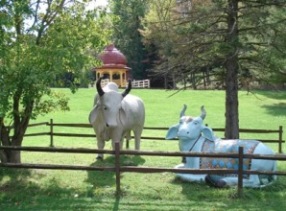
Welcome to Brijabasi Spirit
Thank you for taking the time to visit the New Vrindaban community blog. Think of visiting our blog as making a virtual pilgrimage.
Hare Krishna Hare KrishnaKrishna Krishna Hare Hare
Hare Rama Hare Rama
Rama Rama Hare Hare
"May cows stay in front of me; may cows stay behind me; may cows stay on both sides of me. May I always reside in the midst of cows."
Hari Bhakti-vilas 16.252
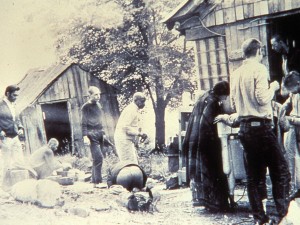

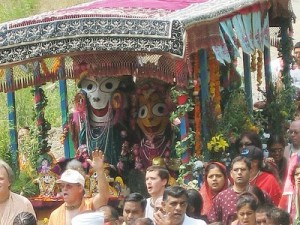



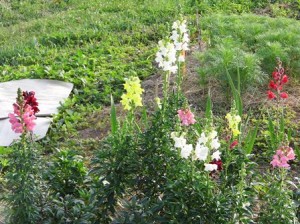
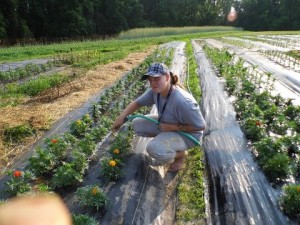




Recent Comments